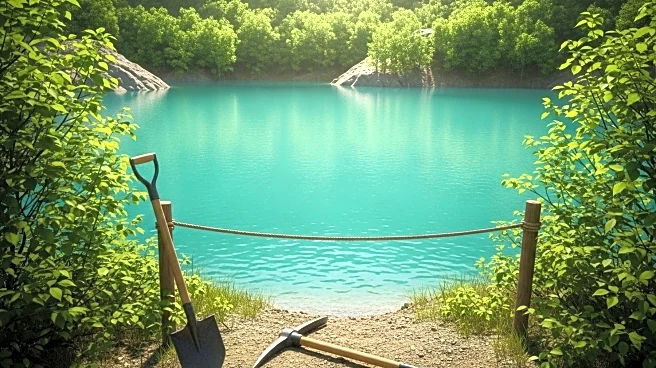What's Happening?
Ecuador's government has revoked the environmental license for DPM Metals, a Canadian mining company, to develop the Loma Larga gold project. This decision comes after significant opposition from residents and authorities in the Azuay province, where the project is located. Concerns were raised about the potential impact on the Quimsacocha water reserve, which is crucial for local communities' health and well-being. The Environment and Energy Ministry cited technical reports from local authorities responsible for drinking water and irrigation systems as the basis for the revocation. DPM Metals had planned to invest $419 million in the project, aiming for an annual production of 200,000 ounces of gold over the first five years. Despite previous suspensions and legal challenges, the project faced strong local resistance due to environmental concerns.
Why It's Important?
The revocation of the environmental license for the Loma Larga project underscores the growing tension between economic development and environmental conservation in Ecuador. The decision reflects the government's commitment to protecting natural resources and prioritizing the health of local communities over mining interests. This move could have significant implications for the mining industry in Ecuador, which has faced legal and local opposition in recent years. With only two mining companies currently operating in the country, the revocation may deter future investments in the sector. The protection of the Quimsacocha water reserve is vital for the region's ecosystem and the communities that depend on it, highlighting the importance of sustainable development practices.
What's Next?
The revocation of the license may lead to further legal challenges from DPM Metals, as the company had already invested in the project. The government may need to navigate potential diplomatic and economic repercussions from Canada, given the international nature of the investment. Local communities and environmental groups are likely to continue advocating for the protection of natural resources, potentially influencing future policy decisions. The situation may prompt other mining companies to reassess their strategies in Ecuador, considering the strong emphasis on environmental conservation and community rights.
Beyond the Headlines
The decision to revoke the license highlights broader ethical considerations in balancing economic growth with environmental stewardship. It raises questions about the long-term sustainability of mining practices and the role of government in safeguarding natural resources. The case may set a precedent for other countries facing similar dilemmas, influencing global discussions on responsible resource management and the rights of indigenous and local communities.









